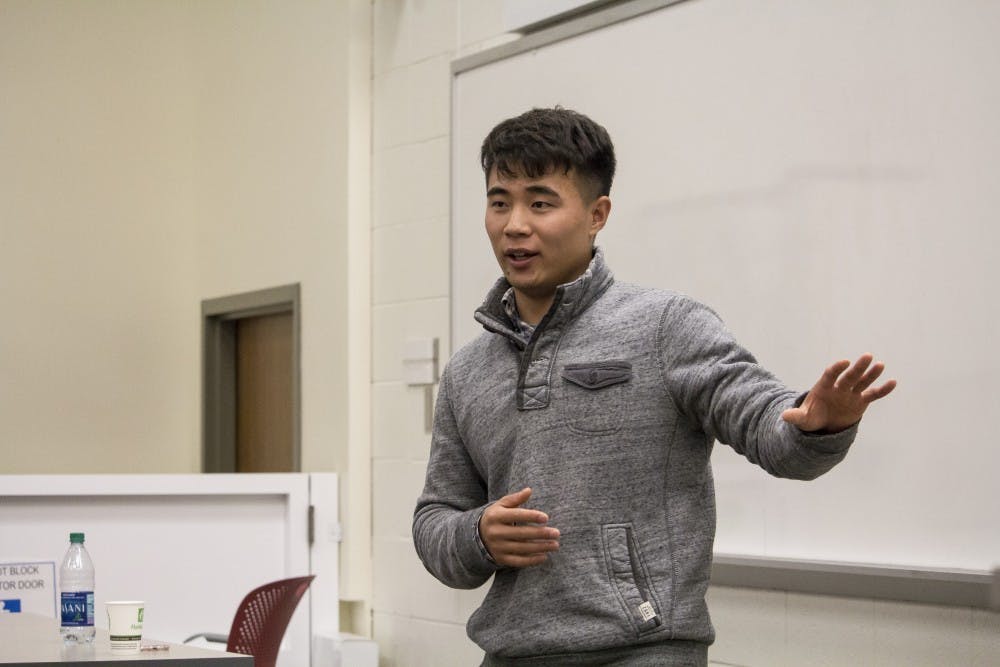Charles Ryu said he's one of only 275 North Korean defectors living in the United States.
“Sometimes I wonder why it was me,” Ryu said.
With an easy smile and calm voice in Hodge Hall on Tuesday, Ryu shared how he managed to escape not once, but twice from the most repressive regime in the world.
“It makes my view more concrete of what North Koreans are really like,” junior John Lai said.
Ryu was born in 1994 to a Chinese father, who abandoned Ryu at age 5, and North Korean mother, who died of starvation when Ryu was 11.
When he was 14, Ryu and his stepbrother escaped. They bribed border guards, swam across a river and met Ryu’s father in a taxi in China.
Ryu said life was much better in China, because he didn’t have to beg for food and could watch foreign media, like K-Pop.
But his happiness was temporary.
“I remember the day I lost all hope,” Ryu said.
The Chinese government doesn’t recognize North Koreans as refugees, and those caught are deported.
Ryu was captured by Chinese police and was kept in a Chinese jail for two weeks before being sent back to North Korea.
Upon reentering his home country, Ryu was interrogated for months by the North Korean government.
Fifteen-year-old Ryu was then sent to a labor camp where he was given 150 kernels of rice to fuel 12 hours of work every day.
One morning, Ryu was so overcome by starvation that he ate rice from dry vomit he found on a roadside.
After nine months, Ryu couldn’t stand or even lift an arm. While others have to work until they die, Ryu was released after nine months because of his young age, physical weakness and relatively insignificant crime of trying to unite with his father.
As he regained strength, Ryu started working at a coal mine. He said his peers went crazy when he shared the freedoms he had experienced in China, like watching South Korean dramas and K Pop, and eating white rice, seafood and fruit.
“Every time I told these stories to my friends, it reminded me, 'What am I doing here,'"Ryu said.
Ryu said the risk of escaping for a second time, a crime punishable by death, outweighed working in a coal mine until he lost a limb or died.
He stole five flashlights from the coal mine, sold them for food and waited three months for an opportunity to travel to the border.
When he spotted a train car bound for the North Korean border, Ryu seized his chance. He took advantage of his young age and small stature, telling the train guard his mom had already boarded the train with their tickets.
He spent the next two days hiding from the guards on the train.
Ryu said the train had almost reached its destination when he was grabbed by his neck and told he would be handed over to the police at the next stop.
Remembering the constant feelings of hunger and despair at the labor camps, Ryu jumped off the moving train, rolled into a ditch and sprinted into nearby woods.
He walked for hours and illegally boarded another train before finally making it to the border town.
Ryu tried to convince a friend at the border town to escape with him, promising his father would take care of them both. But the friend had a crush on a North Korean girl, and decided to stay. Ryu said he isn’t sure if that friend is still alive.
“I really hope that girl is worth it,” Ryu said.
By himself, Ryu swam through a river and walked for three days, without water or food, into China. Just when he had enough blisters he couldn’t continue, Ryu met a motorcyclist who helped him travel to his father.
With the help of an unknown travel broker, Ryu migrated to Southeast Asia and arranged for his passage to the U.S.
He had no experience with English or capitalism, but he was still glad to arrive in the U.S.
“As I stepped off the plane, I felt changed feelings I’d never known before,” Ryu said. “Safety.”
Ryu said meeting Americans quickly showed him that his North Korean education, which depicts Americans as wolves with long noses and beards, was not accurate. All subjects in the North Korean elementary school curriculum reinforce the idea that Americans are evil, he said.
Since arriving in America five years ago, Ryu has graduated high school and worked as a sushi chef, Uber and Lyft driver and driving instructor.
He had to start texting instead of writing letters, and ride cars instead of cows.
He currently interns for Liberty in North Korea, a nonprofit advocacy group that raises awareness about North Koreans and fundraises to rescue North Korean refugees.
LiNK at IU sponsored Ryu’s talk, which Ryu said is a small gift to those still struggling under the regime.
Despite the brainwashing, interrogation and labor he endured, Ryu said he does not resent North Korea.
“It’s my hometown,” Ryu said. “It’s not the people I hate. It’s the government.”




